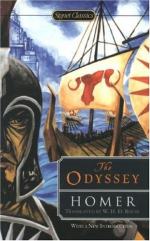Lotus-land, therefore, being ten days’ sail from Malea, was well over the limit of the discovered world. From this country Odysseus went on till he reached the land of the lawless Cyclopes, a pastoral people of giants. Later Greece feigned that the Cyclopes dwelt near Mount Etna, in Sicily. Homer leaves their place of abode in the vague. Among the Cyclopes, Odysseus had the adventure on which his whole fortunes hinged. He destroyed the eye of the cannibal giant, Polyphemus, a son of Poseidon, the God of the Sea. To avenge this act, Poseidon drove Odysseus wandering for ten long years, and only suffered him to land in Ithaca, ‘alone, in evil case, to find troubles in his house.’ This is a very remarkable point in the plot. The story of the crafty adventurer and the blinding of the giant, with the punning device by which the hero escaped, exists in the shape of a detached marchen or fairy-tale among races who never heard of Homer. And when we find the story among Oghuzians, Esthonians, Basques, and Celts, it seems natural to suppose that these people did not break a fragment out of the Odyssey, but that the author of the Odyssey took possession of a legend out of the great traditional store of fiction. From the wide distribution of the tale, there is reason to suppose that it is older than Homer, and that it was not originally told of Odysseus, but was attached to his legend, as floating jests of unknown authorship are attributed to eminent wits. It has been remarked with truth that in this episode Odysseus acts out of character, that he is foolhardy as well as cunning. Yet the author of the Odyssey, so far from merely dove-tailing this story at random into his narrative, has made his whole plot turn on the injury to the Cyclops. Had he not foolishly exposed himself and his companions, by his visit to the Cyclops, Odysseus would never have been driven wandering for ten weary years. The prayers of the blinded Cyclops were heard and fulfilled by Poseidon.
From the land of the Cyclops, Odysseus and his company sailed to the Isle of Aeolus, the king of the winds. This place too is undefined; we only learn that, even with the most favourable gale, it was ten days’ sail from Ithaca. In the Isle of Aeolus Odysseus abode for a month, and then received from the king a bag in which all the winds were bound, except that which was to waft the hero to his home. This sort of bag was probably not unfamiliar to superstitious Greek sailors who had dealings with witches, like the modern wise women of the Lapps. The companions of the hero opened the bag when Ithaca was in sight, the winds rushed out, the ships were borne back to the Aeolian Isle, and thence the hero was roughly dismissed by Aeolus. Seven days’ sail brought him to Lamos, a city of the cannibal Laestrygonians. Their country, too, is in No-man’s-land, and nothing can be inferred from the fact that their fountain was called Artacia, and that there was an Artacia in Cyzicus. In Lamos a very important adventure




